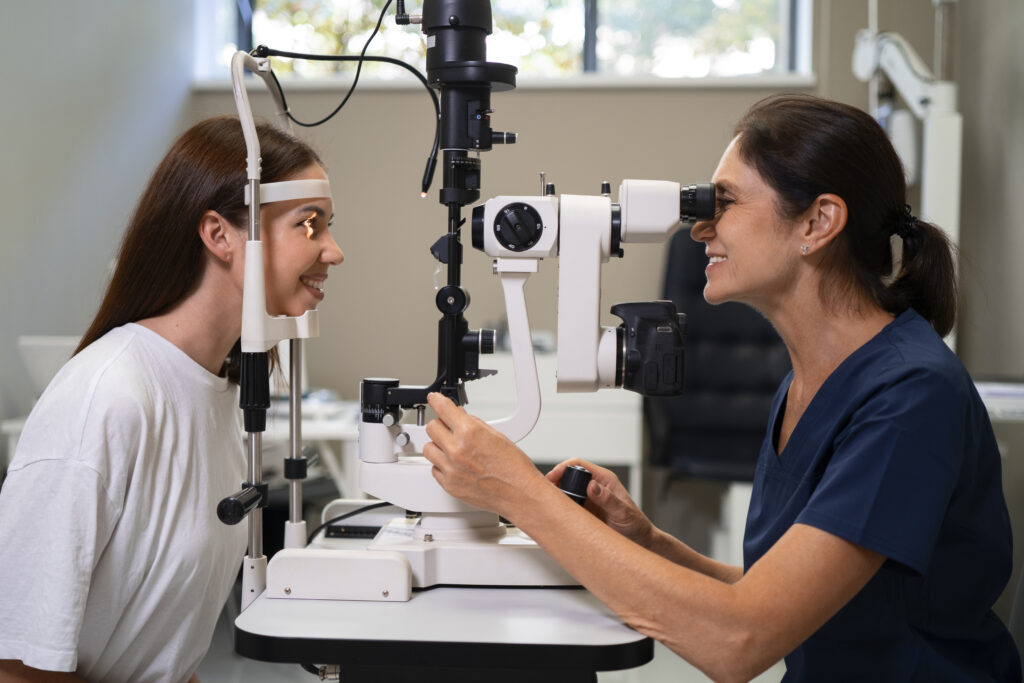Now Offering Free LASIK Consultations: Book Online Now!

When was the last time you had an eye exam? If you’re like most people, it’s probably been longer than it should. But your eyes can’t speak up when something’s wrong—and many serious eye conditions can develop slowly and silently. That’s why early detection through comprehensive eye exams is one of the most important things you can do for your health.
At Eye Care of San Diego, with welcoming clinics in Mission Hills, La Jolla, and Sorrento Valley, our experienced team makes it easy to stay proactive. Whether you’re young, middle-aged, or enjoying your golden years, regular eye exams can help catch potential problems early—before they impact your vision or overall wellness.
What Is a Comprehensive Eye Exam?
Think of a comprehensive eye exam as a full wellness check-up—but specifically for your eyes. It goes far beyond simply updating your glasses or contact lens prescription. At Eye Care of San Diego, these exams are performed by our licensed optometrists Dr. Nghi Duong, Dr. Sara Julazadeh, and Dr. Philip Taunton using the latest in diagnostic technology to evaluate every part of your visual system.
Here’s what you can expect during a Comprehensive Eye Exam:
- Medical & Vision History Review: We’ll ask about your health, family history, medications, and any symptoms you’re experiencing.
- Visual Acuity Test: Measures how well you can see letters on an eye chart, one eye at a time.
- Refraction Test: Determines if you need vision correction and what your precise prescription should be.

- Eye Muscle and Tracking Evaluation: Ensures your eyes are working together as a team, and identifies issues like lazy eye or binocular vision problems.
- Slit Lamp Exam: A magnified view of the structures at the front of your eye—like your cornea, iris, and lens—using a special microscope and light.
- Dilated Eye Exam: Drops are used to widen your pupils so we can get a clear view of the retina, optic nerve, and blood vessels in the back of your eye.
- Tonometry (Eye Pressure Test): Measures the pressure inside your eye, a critical test for detecting glaucoma.
- Peripheral Vision Test: Checks your side vision, which may be affected by conditions like glaucoma or neurological disorders.
What Can We Catch Early? More Than You Think
Comprehensive exams allow us to catch a wide range of eye-related and even general health issues—often before you experience any symptoms.
Common Eye Diseases Detected Early:
- Glaucoma: Often shows no early symptoms but causes permanent optic nerve damage over time. Early detection can save your vision.
- Macular Degeneration: Affects your central vision and is one of the leading causes of vision loss in older adults. Early treatment can slow progression.
- Cataracts: Cause cloudy, blurred vision as you age. Cataract surgery is extremely effective—but only if diagnosed in time.
- Diabetic Retinopathy: A serious complication of diabetes that damages the blood vessels in the retina. Early diagnosis can prevent severe vision loss.
- Retinal Tears and Detachments: May start with flashes or floaters, but catching them early is critical to preventing permanent damage.
Other Medical Conditions Eye Exams Can Reveal:
- Hypertension (High Blood Pressure): Changes in the eye’s blood vessels can be an early clue to systemic issues like high blood pressure.
- Diabetes: The tiny vessels in the retina often show signs of diabetes before you even know you have it.
- Autoimmune Diseases: Inflammation in or around the eyes can signal conditions like lupus, rheumatoid arthritis, or multiple sclerosis.
- Thyroid Eye Disease: Bulging eyes, double vision, or discomfort may point to an overactive thyroid.
- Allergies: Chronic red, itchy, or watery eyes may be more than a seasonal nuisance. Identifying and treating eye allergies can improve daily comfort and prevent complications.
- Skin Cancer Around the Eyes: During your exam, we also examine the eyelids and surrounding facial skin—common areas where signs of basal cell carcinoma, squamous cell carcinoma, or melanoma can appear.
The Risks of Delaying Eye Exams
Waiting until symptoms appear can have serious consequences. Many eye diseases are irreversible once damage has occurred. For example, glaucoma-related vision loss cannot be restored, and by the time symptoms emerge, significant harm may have already occurred.
Delays in childhood eye exams can hinder development and learning. In adults, untreated eye conditions can impair work performance, increase fall risk, and reduce quality of life. Seniors are particularly vulnerable, as vision loss can affect independence and safety.
By visiting Eye Care of San Diego, you gain access to leading specialists and a team committed to prevention. Their Mission Hills, La Jolla, and Sorrento Valley clinics are staffed with experienced professionals ready to help you preserve your vision.
Being Proactive: What You Can Do
The American Optometric Association recommends:
- An eye exam at 6 months, 3 years, and before school starts for children.
- Exams every 1–2 years for adults under 60.
- Annual exams for adults 60+, or for those with conditions like diabetes.
Eye Care of San Diego offers flexible scheduling across its three San Diego locations to make routine exams convenient. Along with regular checkups, maintaining a healthy diet, wearing UV-blocking sunglasses, avoiding smoking, and managing chronic health issues also contribute to long-term eye health.
Conclusion
Your eyesight is too important to take for granted. Comprehensive eye exams are a simple but powerful tool in detecting diseases early and protecting your vision for life. With trusted care from Eye Care of San Diego in Mission Hills, La Jolla, and Sorrento Valley, you can be proactive—not reactive—about your eye health. Schedule your comprehensive eye exam today and take the first step toward a lifetime of clear, healthy vision.








